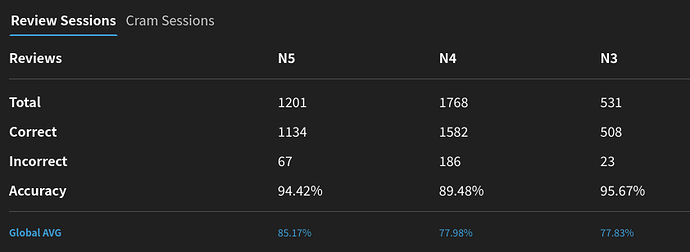On N4, It was a pain in the ass to do 3 points per day, and I was always feel pushing myself too much. But now, I can easily do 5 points, and I feel better retention than ever. Currently, I’m at 95/217 points from N3, and my stats seem to corroborate with my feelings about my retention:
Going into N3 fearless, I watched a bunch of Cure Dolly videos to help with N5+N4 stuff that were still bugging me, and changed my learning strategy routine a little bit. I assumed that was the reason behind N3 becoming easier, but maybe it’s actually easier and I’m just fooling myself? 





 .
.

 .
.